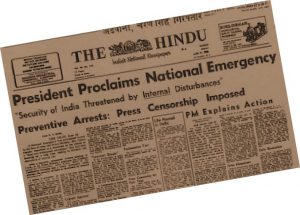At 9.30 p.m., on the night of 25-6-1975, the Proclamation was sent to President Fakhruddin Ali Ahmed. No Cabinet meeting had been held to discuss the matter much less to approve of the measure. Smt Gandhi evidently wanted even her colleagues to face a fait accompli. The President also did not insist on a cabinet meeting but was persuaded to sign the midnight Proclamation. It is a historic irony that the order of a Judge keen on preserving the rule of law provided the excuse for its suspension.
The Report of the Shah Commission and now the book The Emergency by Smt Coomi Kapoor shows that the actual preparation for an internal emergency had started much earlier. Smt Gandhi was being advised by a core group close to her viz. Siddhartha Shankar Ray (the Chief Minister of West Bengal), D.K. Barooah (the Congress President), Rajni Patel, Chairman of the Bombay Pradesh Congress Committee and Balasahab Gokhale, the last two being the contribution of the Bombay Bar. A declaration of emergency necessitates an elaborate administrative legal framework. An earlier model was already available in the Defence of India Act and various subsidiary orders thereunder. The list of proposed detenus which was being prepared from as early as January 1975 had to be updated. One critical declaration now invoked was under Article 359(1) which denied anyone to move any court for enforcement of the rights guaranteed by Articles 14, 21 and 22.
The Bombay High Court was particularly fortunate to have an independent and resolute leadership provided by Chief Justice Kantawala and Justice Tulzapurkar. On some occasions, even the sword of transfer was invoked by the Government against some of the Judges. For instance, Justice Vimadalal was transferred to the Andhra Pradesh High Court. A transfer order was also passed against Justice Mukhi who was keeping indifferent health. He was abruptly ordered to be transferred to the Calcutta High Court. Unfortunately, the news weighed so heavily on him that he passed away in September 1976, even though by this time his transfer order had been revoked.3
† Written on the occasion of the 150th Anniversary of the Bombay Bar Association.
1. Raj Narain v. Indira Nehru Gandhi, Election Petition No. 5 of 1971, decided on 12-6-1975 (All).
3. “Mr Justice P.M. Mukhi” (1976) 78 Bom LR J-1.
Image Courtesy: The Hindu

